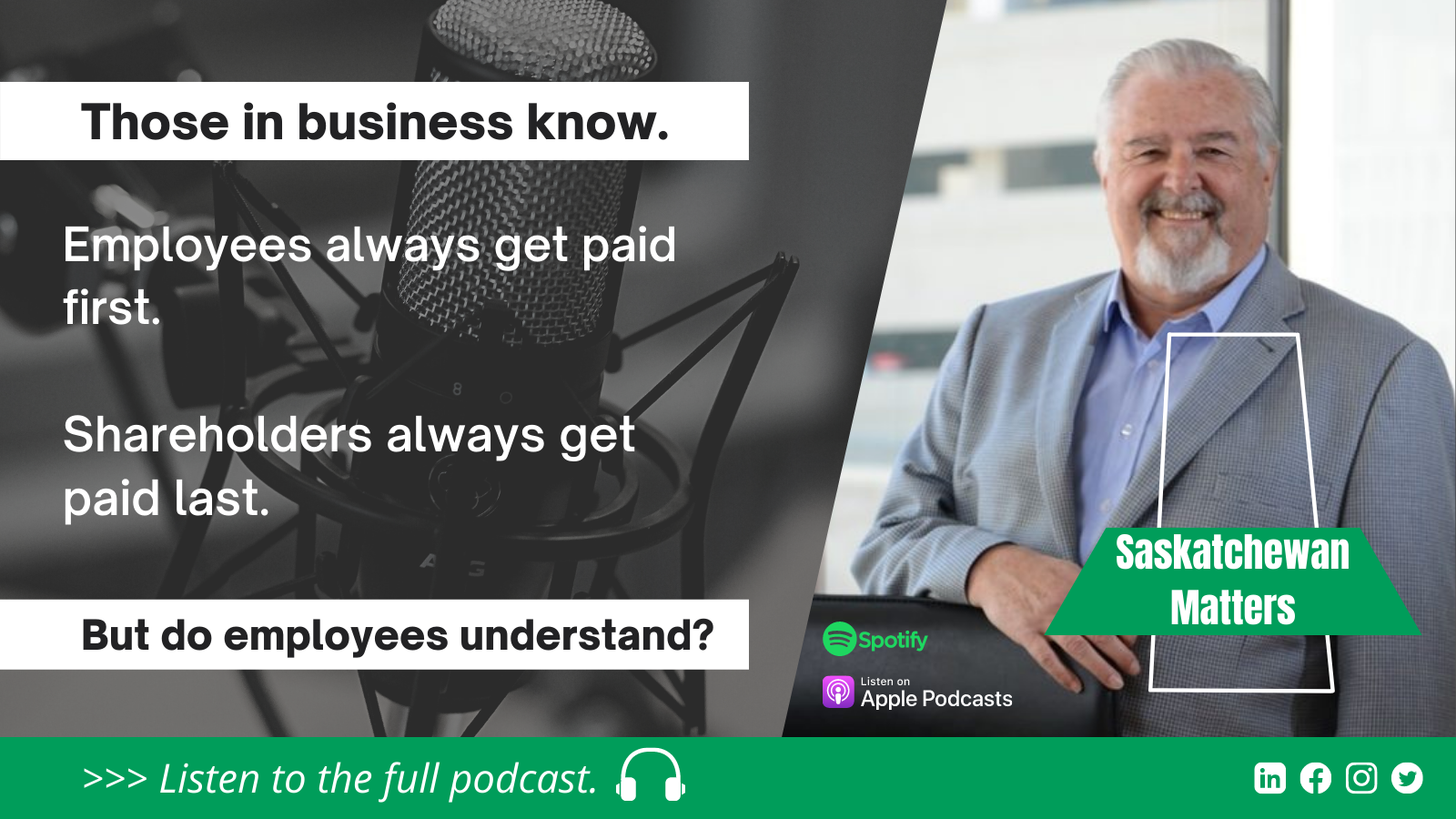Saskatchewan Matters podcast from Martin Charlton Communications.
The Great Resignation and other developments have made the tension between employees and employers apparent with employees often unaware of the financial pressures on their employers and employers not often enough clarifying how much value an employee is required to deliver.
People in Saskatchewan and beyond are closely examining the employer-employee relationship as jobs go unfilled and workers seek opportunities that match their expectations.
Employees and employers rethinking their relationship could close the gap between them by developing a shared understanding. Workplaces that make it clear the value a worker must generate for a business so that an employer can afford to sustain an employment opportunity could be the way of the future.
A shared understanding is possible if both sides take responsibility for their relationship. For that understanding to develop, employees need to be curious about the financial pressures on their employer. At the same time, owners have to be willing to share at least some financial information with their workforce.
The question identifying the disconnect between employees and employers
A simple question was all it took for one Saskatchewan employer in the service industry to recognize the gap that exists between his employees’ perspective and his own as an employer.
He asked his workers what should it cost this business to generate a dollar in revenue. While he had the exact figure, employees were guessing at the number. The employees were out about 20 cents from the real figure, revealing the disconnect between them and their employer. His margins were much thinner than his employees knew.
His experience is hardly unique.
Financial pressures weigh heavy on employers
What is often not recognized by workers are all the expenses an employer incurs when employing workers.
For example, an employee paid an hourly rate might have the perspective that they are trading their time for money. They know what they receive for an hour of their time.
However, the cost of hiring an employee goes beyond what a worker sees deposited in their bank account. What an employee might not take into account is that in addition their hourly rate, an employer also makes contributions to the Canadian Pension Plan (CPP) as well as Employment Insurance (EI) on their behalf. If their employer offers a benefits program and pension plan, those are additional expenses.
Then, there is the equipment and space needed by the employee to fulfill their duties. Providing a laptop and an office, for example, are expenses covered by the employer.
These expenses quickly add up, making it necessary for an employee to generate revenue that is worth up to five times what it costs to pay for their salary. Not generating this much value can make it too difficult for an employer to carry their position.
Ensuring that payroll can be paid out is often an employer’s most pressing concern. Other factors, such as supply chain issues, put pressure on an employer over the longer term, but not being able to pay employers can quickly be the end of a business.
Dispelling myths believed by employees
For an employee to recognize this pressure, they must have some of that financial information shared with them by their employer. It is not uncommon for employers to be uncomfortable sharing such sensitive knowledge, but doing so can be the beginning of dispelling other myths commonly believed by employees.
It is common for employees to believe that owners grow rich on the revenue generated by the company. The reality is many others have to get paid before the owner does, including employees. When the business is profitable and profits are shared, front-line employees receive their portion before managers and executives, if there is any remaining for those managers and executives.
Then, there is the need to reinvest in the business to maintain and grow its productivity. For example, new equipment needs to be purchased. That too eats away at what an owner can pay themselves.
Unless employers share some of that financial knowledge with employees, workers won’t be able to see and understand beyond their personal situation to identify with the pressures faced by managers and the owner of the business.
This all contributes to a disconnect between the reality faced by employers creating and sustaining jobs and employees wanting secure and satisfying employment. That disconnect is contributing to the Great Resignation and is a factor in what is known as disintermediation.
Reconsidering the Great Resignation
Numerous employees today are looking for personal fulfillment in their jobs, a perspective encouraged by parents and others who tell young people they should find work that connects to their passion. This is causing some to search their souls to determine how they wish to spend their working days.
No one wants to spend their days detesting where they are and what they do to earn a living, but expecting to feel passion at work can be self-defeating. Not only can it be difficult to find, it can be impractical to depend on a job to feel passion. Thinking about your own interests doesn’t generate revenue and is unlikely to ensure job security.
Creating and supporting employment opportunities
So, who and what should the employee focus on instead?
One senior executive working for one of the biggest companies in Saskatchewan puts it this way. If his boss is mildly interested in something, he is infatuated by it.
Alternatively, there are the customers of the business to focus on. Paying attention to the customers’ passion more than your own and satisfying their interests is more likely to keep an employee in stable employment earning a healthy income.
Employees can be encouraged to figure out what problems exist and develop solutions for them. They can be empowered to determine what could be done better and entrusted to work to advance those improvements. That is where opportunity exists, not just for entrepreneurs, but for employees.
Selling specialized skills
This also applies to disintermediation. Employers have needs and employees have skills. As people develop very specialized sets of skills, they can offer to work for those who have need of those skills. A person can work as an employee for a single employer. Or, they could work for numerous employers on a contract basis.
From the employer’s perspective, they can develop a position and find someone to fill it. Or they can contract someone who has developed themself to become highly specialized to fulfill a particular need. This can be an efficient and effective way to bring external expertise into a company for a specified requirement in its operations.
Essentially, this helps explains the gig economy in which workers can make their skills available to employers in an arrangement they spell out in a contract.
Work as a transaction
With many employers creating jobs, but not being able to find people to fill them, the business community will need to reconsider its relationship with employees. As employees consider their expectations around work and look for opportunities that match those expectations, they will need to look at stable employment and earning income in a new way.
Sharing an understanding that work is a transaction – not of being paid for one’s time, but for generating value – is a step forward that will benefit workers and employers as well as those served by the business.

